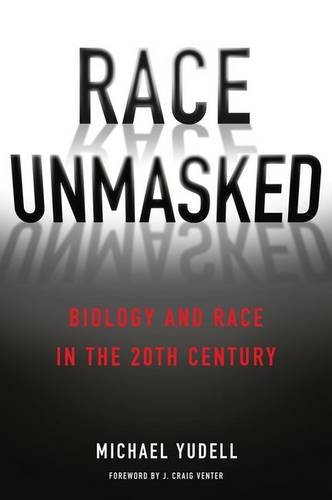
Race Unmasked
Biology and Race in the Twentieth Century
- اطلاعات
- نقد و بررسی
- دیدگاه کاربران
نقد و بررسی

September 15, 2014
Science shows that only 0.1% of nucleic acids in the human genome differ on average between individuals, yet despite such evidence, science is still used to fuel racism says Drexel University public health professor Yudell. Indeed, while geneticist J. Craig Venter gave a White House talk in 2000 noting that race has little to do with genetics, and social scientist W.E.B. DuBois penned a similar message a century before, as Yudell writes, "we are having frustratingly similar arguments about race and human difference despite the benefit of 100 years of knowing better." Venter explains in his foreword that it may once have been a selective advantage to fear the "stranger coming to your cave," though a similar condemnation of racismâas an obsolete hunter-gatherer instinctâwas attacked as a rationalization when articulated by Pulitzer-Prize winning biologist E.O. Wilson in Sociobiology (1975). Yudell notes that "the intellectual claims of sociobiologyâintentionally or notâcould and did serve the needs of those who harbored racist ideas by giving them scientific legitimacy." From Darwin's "survivorship of the fittest," misused by eugenicists, to Linnaeus' taxonomic classificationsâmisused by Linnaeus himselfâscience has long played a role in perpetuating racism. This intensely deliberative book unearths many subtle and not-so-subtle examples of this complex historic relationship.

August 1, 2014
A history of the concept of race in American scientific thought. Yudell (Public Health/Drexel Univ.; co-editor: The Genomic Revolution: Unveiling the Unity of Life, 2002) traces how the concept of race evolved from the eugenicists of the early 20th century to present-day geneticists. He argues that the biologic concept of race originated with eugenic theories of race difference, was integrated into modern biologic thought by evolutionary biologists in the 1930s and '40s, and continues to generate controversy as a classification tool. In examining the history of racial science, Yudell looks at the work of specific scientists and institutions, among them the eugenicist Charles Davenport and the National Research Council in the 1920s and '30s, evolutionary biologist Theodosius Dobzhansky, population geneticist L.C. Dunn, anthropologist Ashley Montagu and UNESCO in the 1940s and '50s. The author's account of the controversy aroused by Carleton Coon's The Origin of Races (1962) makes especially interesting reading, as do his discussions of the pseudoscientific work of Alfred Jensen and William Shockley and the clash between sociobiologist E.O. Wilson and evolutionary biologist Richard Lewontin in the 1970s. In the final chapter, "Race in the Genomic Age," Yudell tackles the impact of the genomic revolution on the biological race concept. Scientists who use the race concept in genomic research claim that technological improvements allow them to examine human diversity unhampered by social prejudice. Social and natural scientists argue that the race concept is a flawed, inaccurate way to measure human diversity inseparable from social prejudice. Genome scientists say that the race concept is not accurate but is a useful proxy in clinical settings. J. Craig Venter, who wrote the foreword, opines that instead of relying on an individual's appearance or self-identified ethnicity, looking directly at his genomic sequence is the best way to personalize medicine. The controversy continues. A challenging, well-researched work that clearly shows the interconnectedness of scientific and social thought.
COPYRIGHT(2014) Kirkus Reviews, ALL RIGHTS RESERVED.

Starred review from August 1, 2014
Yudell (public health, Drexel Univ.) presents a detailed history of the concept of race and its evolution throughout the 20th century. The author explores the conflicts between scientists on the side of race as a biological concept and those who believe that it is mostly a social construct. The first half of the book discusses the American eugenics movement that was prominent in the early 20th century, and its earliest practitioners, Francis Galton in England and Charles Davenport in America. As early as 1906, W.E.B. DuBois and others refuted the eugenicists, and by the late 1930s their theories were becoming far less fashionable. The second part of the volume covers the work of Theodosius Dobzhansky, L.C. Dunn, Ashley Montagu, Curt Stern, E.O. Wilson, and Richard Lewontin, and their roles in continuing to define the concept of race. Yudell closes with the work of the Human Genome Project and how its findings have added to the discussion. The author uses scientists' personal correspondence to add flavor and human interest to what otherwise might have been a dry discussion. VERDICT For science historians, social scientists, and those with an interest in the race concept and the history of the eugenics movement.--Rachel Owens, Daytona State Coll. Lib., FL
Copyright 2014 Library Journal, LLC Used with permission.




دیدگاه کاربران